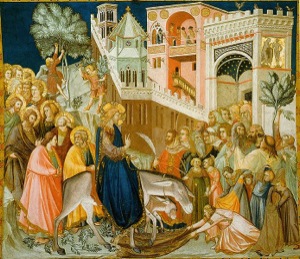
Imagine I have two glass mugs. One is filled with sand, and the other with rocks. They symbolize the ways we can order our lives. The sand symbolizes the millions and millions of little details that fill our days – what to eat, what to wear, what to watch on TV, etc. The rocks are the big things, like family and loved ones, or church or a job that provides for you, or taking Sabbath time.
Here’s the illustration – if you pay attention to the little things first, that’s all you’ll ever get to. You can’t put the big rocks in if you put the sand in your jar first. The point is, if you put the big things first, everything else will fall into place. What a great image!
Now wouldn’t it be great, after seeing this fabulous illustration that it would guarantee our lives from this point on will be so neatly ordered. As they say, the devil is in the detail.
It’s so easy to get buried in the little things – consumed by the tyranny of the urgent. If we don’t pay attention, the big things, like time with our loved ones; savoring meals instead of shoveling down the food; Sabbath rest with God, those things too often get left behind. Our lives get filled with the little things, and there’s all sand, and no room for the big things. Can you identify with this?
In the Old Testament book of Ecclesiastes the Teacher has done plenty of reflecting. The Teacher-writer has seen what’s good about life – good food, meaningful work, healthy relationships – and come to the conclusion that the best thing we can do is enjoy these things. And the Teacher’s been pretty honest too; that more often than not, people have their sand and their rocks out of order. That too many days are spent “chasing after the wind.”
It’s so easy to go through life and before you know it, our lives are filled up. At some point, we need to be intentional about how we’re living our lives … intentional, so that there’s room for the important things in our lives.
Being intentional is not the same as being in control. But neither is it throwing up your hands and saying, “Oh well!” Living with intentionality means knowing what’s important to you. It means taking an honest look at whether the path you’re on reflects that.
For example, if you want to retire comfortably, you need to save some of your money instead of having to buy the latest gadget that you just can’t live without. If you don’t want to be alone, then you need to make the effort to reach out instead of waiting for people to come to you. If you want to be healthy, you have to watch what you eat and get some daily exercise.
A life of intentionality takes work. You might have heard the saying, “Most people don’t plan to fail. They just fail to plan.” When we fail to plan, we end up being pulled in a million different directions. But when we know where we want to go, we’re much more likely to get there and more likely to find peace, joy and satisfaction along the way.

A few weeks ago we, the Christian faith, celebrated Palm Sunday. Crowds gathered and shouted, “Hosanna! Hosanna in the highest heaven!” I wonder who the people were in the crowd that day. After all, there was a much bigger parade happening on the other side of town. The Roman governor, Pontius Pilate, was arriving in town about the same time.
Now that would’ve been something to see! I’m sure the horses were bigger and stronger than many of the people had seen before; the armor of Pilate’s entourage would’ve sparkled in the sun, and all of the most important people of Jerusalem would’ve been there showing up to give their necessary allegiance to the Roman empire.
But you wouldn’t have found signs of power and grandeur in the parade surrounding Jesus coming into town from the east. It’s safe to say that his crowd was looking for something different from the one that clamored to get a glimpse of Pilate.
It wouldn’t surprise me that the largest number in the crowd would have been the same people whom Jesus met throughout the previous three years. They were the people who had experienced pain and brokenness in life; and those whom society’s systems had failed them; and those who were marginalized. They were the ones who had been delivered; the ones who were blind but now could see, surrounded by the little children whom Jesus always welcomed.
In all of the excitement, in the festive almost electric atmosphere, Jesus says nothing. There are no promises or stump speeches. It’s not a political rally or even a candidate’s appearance at the local Passover parade. It seems that Jesus is focused on another time and another place.
Yes, something is happening … these two parades coming into Jerusalem will meet. In less than a week, people will dramatically change allegiances, but not yet, not now. This parade is only the beginning. The stage is not yet fully set. The people will have to wait to see how Jesus will respond to their hosannas.
Isn’t that the hardest part, the waiting, the not knowing what life will hold? The uncertainty of the future makes people who like control, like me, kind of crazy. Sometimes we’d like God to act with more immediacy, in a way that gives us what we want when we want it – rather than the promise to be with us in a life with so many variables, where God gives us the choice to fill our lives with the little things (sand) that consume us, or the big things (rocks) that are life-giving and affirming.
I’ve got good news; Jesus saves us from the need for control, from our need to use power or fear to get what we want. We can have faith and trust within us so that we can continue stepping forward in life without having to know all the answers all the time. The triumphal entry sets the stage for us to get lost in the mystery of God, and God’s awesome love for us. You are loved!
Rev. Dan Koeshall is the senior pastor at The Metropolitan Community Church (The Met), 2633 Denver Street, San Diego, California, themetchurch.org. Services every Sunday at 9 and 11 a.m.











